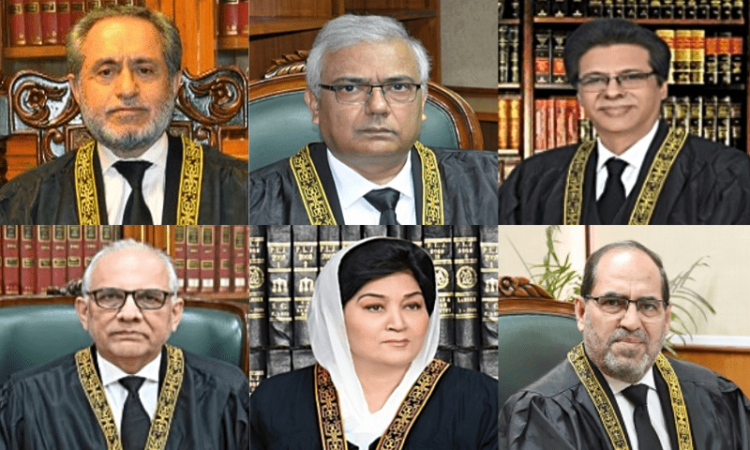Islamabad, January 16, 2025: The Supreme Court’s Constitutional Bench on Thursday ordered the Ministry of Defence to provide comprehensive details regarding military trials of civilians conducted under the Army Act.
The seven-member bench, led by Justice Aminuddin and comprising Justices Jamal Mandokhel, Muhammad Ali Mazhar, Hassan Azhar Rizvi, Musarrat Hilali, Naeem Akhtar Afghan, and Shahid Bilal Hassan, convened to address the contentious issue of military jurisdiction over civilian trials.
During the proceedings, Ministry of Defence lawyer Khawaja Haris argued in favor of military trials for civilians, asserting that they adhered to the established legal framework. Haris claimed that if the relevant provisions of the law were upheld, the petitions challenging these trials would be inadmissible.
However, Justice Hassan Azhar Rizvi raised concerns about the transparency of these trials, questioning whether the accused were given a fair opportunity to present witnesses and if the evidence met constitutional standards. Rizvi clarified that the court’s focus was not on the merits of the cases but on ensuring adherence to due process and the principles of natural justice.
Justice Muhammad Ali Mazhar emphasized that even in the absence of Article 10A, which guarantees the right to a fair trial, military trial procedures must align with legal norms. The bench unanimously reiterated that no one should face punishment without a fair hearing.
In response to the court’s earlier request for records of military trials, Khawaja Haris agreed to present the details of one case for review. Justice Jamal Mandokhel questioned whether military trial laws could be amended to better address the inclusion of civilians, while Justice Musarrat Hilali inquired about the necessity of Article 10A in ensuring fair trial rights.
A major point of contention was the Army Act’s provision for trying civilians in military courts. Justice Jamal Mandokhel argued that the act, originally intended to govern armed forces personnel, might be misapplied to civilians. He suggested that if separate legislation existed for civilian criminal offenses, this issue might not have arisen.
Justice Naeem Akhtar Afghan highlighted the 1967 amendment to the Army Act, which introduced the term “any person,” effectively extending the act’s scope to civilians and retired officers. He noted that if this amendment were found unconstitutional, it could invalidate numerous trials, including the high-profile case of FB Ali. Afghan proposed that a constitutional amendment might have been necessary to include civilians under the Army Act.
Justice Naeem Akhtar Afghan remarked that the introduction of Article 10A has intensified debates around fair trial rights, particularly regarding civilians and retired officers tried under military courts. He pointed out that legislative oversight may have complicated the legal framework, warranting a constitutional amendment for clarity.
Khawaja Haris, however, argued that the constitutional amendment related to civilian trials had a different legislative intent. Despite this, the court remained unconvinced and directed the Ministry of Defense to submit a complete record of all civilian trials conducted by military courts, excluding high-profile cases such as that of Kulbhushan Jadhav.
The bench emphasized the importance of ensuring that military courts operate transparently and in line with constitutional guarantees. It instructed the Ministry of Defense to provide details on the classification of civilian trials by military courts and how legal safeguards were implemented.
The hearing was adjourned for further deliberations, with the court reiterating its commitment to safeguarding the rights of the accused and ensuring that the application of law remains fair and just.








